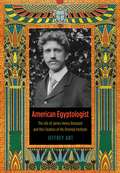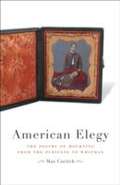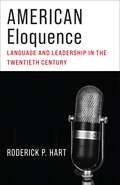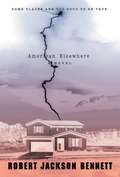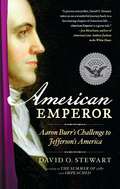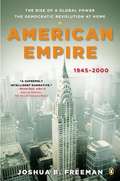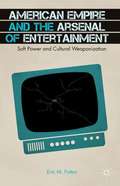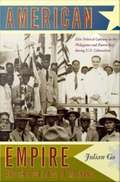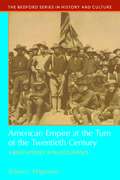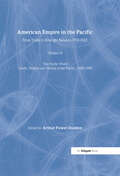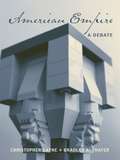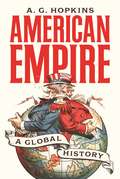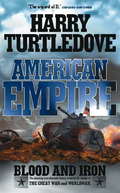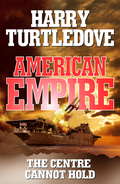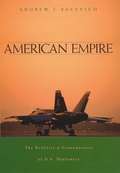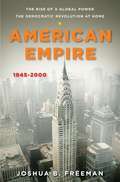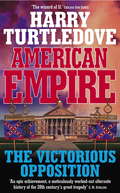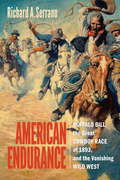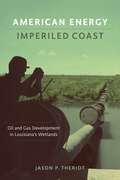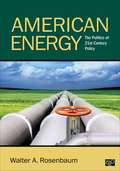- Table View
- List View
American Egyptologist: The Life of James Henry Breasted and the Creation of His Oriental Institute
by Jeffrey AbtJames Henry Breasted (1865-1935) had a career that epitomizes our popular image of the archaeologist. Daring, handsome, and charismatic, he traveled on expeditions to remote and politically unstable corners of the Middle East, helped identify the tomb of King Tut, and was on the cover of Time magazine. But Breasted was more than an Indiana Jones--he was also an accomplished scholar, academic entrepreneur, and talented author who brought ancient history to life not just for students but for such notables as Teddy Roosevelt and Sigmund Freud. In American Egyptologist, Jeffrey Abt weaves together the disparate strands of Breasted's life, from his small-town origins following the Civil War to his evolution into the father of American Egyptology and the founder of the Oriental Institute in the early years of the University of Chicago. Abt explores the scholarly, philanthropic, diplomatic, and religious contexts of his ideas and projects, providing insight into the origins of America's most prominent center for Near Eastern archaeology. An illuminating portrait of the nearly forgotten man who demystified ancient Egypt for the general public, American Egyptologist restores James Henry Breasted to the world and puts forward a brilliant case for his place as one of the most important scholars of modern times.
American Egyptologist: The Life of James Henry Breasted and the Creation of His Oriental Institute
by Jeffrey AbtJames Henry Breasted (1865–1935) had a career that epitomizes our popular image of the archaeologist. Daring, handsome, and charismatic, he traveled on expeditions to remote and politically unstable corners of the Middle East, helped identify the tomb of King Tut, and was on the cover of Time magazine. But Breasted was more than an Indiana Jones—he was an accomplished scholar, academic entrepreneur, and talented author who brought ancient history to life not just for students but for such notables as Teddy Roosevelt and Sigmund Freud.In American Egyptologist, Jeffrey Abt weaves together the disparate strands of Breasted’s life, from his small-town origins following the Civil War to his evolution into the father of American Egyptology and the founder of the Oriental Institute in the early years of the University of Chicago. Abt explores the scholarly, philanthropic, diplomatic, and religious contexts of his ideas and projects, providing insight into the origins of America’s most prominent center for Near Eastern archaeology. An illuminating portrait of the nearly forgotten man who demystified ancient Egypt for the general public, American Egyptologist restores James Henry Breasted to the world and puts forward a brilliant case for his place as one of the most important scholars of modern times.
American Eldercide: How It Happened, How to Prevent It
by Margaret Morganroth GulletteA bracing spotlight on the avoidable causes of the COVID-19 Eldercide in the United States. Twenty percent of the Americans who have died of COVID since 2020 have been older and disabled adults residing in nursing homes—even though they make up fewer than one percent of the US population. Something about this catastrophic loss of life in government-monitored facilities has never added up. Until now. In American Eldercide, activist and scholar Margaret Morganroth Gullette investigates this tragic public health crisis with a passionate voice and razor-sharp attention to detail, showing us that nothing about it was inevitable. By unpacking the decisions that led to discrimination against nursing home residents, revealing how governments, doctors, and media reinforced ageist or ableist biases, and collecting the previously little-heard voices of the residents who survived, Gullette helps us understand the workings of what she persuasively calls an eldercide. Gullette argues that it was our collective indifference, fueled by the heightened ageism of the COVID-19 era, that prematurely killed this vulnerable population. Compounding that deadly indifference is our own panic about aging and a social bias in favor of youth-based decisions about lifesaving care. The compassion this country failed to muster for the residents of our nursing facilities motivated Gullette to pen an act of remembrance, issuing a call for pro-aging changes in policy and culture that would improve long-term care for everyone.
American Electric Power: Facing the Challenges of Distributed Generation
by Richard H.K. Vietor Hilary WhiteAmerican Electric Power, like most utilities in the USA, is currently exposed to distributed generation and the problem of net-metering. Solar installations in particular have been heavily subsidized, by the state and by regulation, which does not allow grid operators to to recover their fixed costs. This results in stranded assets and cross-subsidies from poor to rich.
American Electric Power: Facing the Challenges of Distributed Generation
by Richard H.K. Vietor Hilary WhiteAmerican Electric Power, like most utilities in the USA, is currently exposed to distributed generation and the problem of net-metering. Solar installations in particular have been heavily subsidized, by the state and by regulation, which does not allow grid operators to to recover their fixed costs. This results in stranded assets and cross-subsidies from poor to rich.
American Elegy: The Poetry of Mourning from the Puritans to Whitman
by Max CavitchPracticed and read form of verse in America, "elegies are poems about being left behind," writes Max Cavitch. American Elegy is the history of a diverse people's poetic experience of mourning and of mortality's profound challenge to creative living.
American Eloquence: Language and Leadership in the Twentieth Century
by Roderick P. HartWhat makes political speech powerful? How does eloquent rhetoric transcend ordinary language? Which stylistic choices allow effective orators to stir emotions and spur action? And in the age of Donald Trump, does political eloquence still matter?This book examines a wide swath of political discourse to shed new light on the meaning and significance of eloquence. Roderick P. Hart, a leading scholar of political communication, develops new ways of measuring persuasiveness and rhetorical power through the use of computer-based methods. He examines one hundred of the most important speeches of the twentieth century, given by presidents and politicians as well as leaders, activists, and cultural figures including Martin Luther King Jr., Lou Gehrig, Mario Savio, Carrie Chapman Catt, and Stokely Carmichael.Deploying the tools of the digital humanities as well as critical rhetorical analysis, Hart considers what distinguishes the linguistic properties of iconic oratory from those of more mundane texts. He argues that eloquence represents the confluence of cultural resonance, personal investment, and poetic imagination, providing empirical metrics for assessing each of these qualities. A quantitative and qualitative exploration of American political speech, this interdisciplinary book offers a powerful argument for why eloquence is essential for a functioning democracy.
American Elsewhere
by Robert Jackson BennettSome places are too good to be true.Under a pink moon, there is a perfect little town not found on any map. In that town, there are quiet streets lined with pretty houses, houses that conceal the strangest things. After a couple years of hard traveling, ex-cop Mona Bright inherits her long-dead mother's home in Wink, New Mexico. And the closer Mona gets to her mother's past, the more she understands that the people of Wink are very, very different ...From one of our most talented and original new literary voices comes the next great American supernatural novel: a work that explores the dark dimensions of the hometowns and the neighbors we thought we knew.
American Emperor: Aaron Burr's Challenge to Jefferson's America
by David O. StewartIn this vivid and brilliant biography, David Stewart describes Aaron Burr, the third vice president, as a daring and perhaps deluded figure who shook the nation’s foundations in its earliest, most vulnerable decades. In 1805, the United States was not twenty years old, an unformed infant. The government consisted of a few hundred people. The immense frontier swallowed up a tiny army of 3,300 soldiers. Following the Louisiana Purchase, no one even knew where the nation’s western border lay. Secessionist sentiment flared in New England and beyond the Appalachians. Burr had challenged Jefferson, his own running mate, in the presidential election of 1800. Indicted for murder in the dueling death of Alexander Hamilton in 1804, he dreamt huge dreams. He imagined an insurrection in New Orleans, a private invasion of Spanish Mexico and Florida, and a great empire rising on the Gulf of Mexico, which would swell when America’s western lands seceded from the Union. For two years, Burr pursued this audacious dream, enlisting support from the General-in-Chief of the Army, a paid agent of the Spanish king, and from other western leaders, including Andrew Jackson. When the army chief double-crossed Burr, Jefferson finally roused himself and ordered Burr prosecuted for treason. The trial featured the nation’s finest lawyers before the greatest judge in our history, Chief Justice John Marshall, Jefferson’s distant cousin and determined adversary. It became a contest over the nation’s identity: Should individual rights be sacrificed to punish a political apostate who challenged the nation’s very existence? In a revealing reversal of political philosophies, Jefferson championed government power over individual rights, while Marshall shielded the nation’s most notorious defendant. By concealing evidence, appealing to the rule of law, and exploiting the weaknesses of the government’s case, Burr won his freedom. Afterwards Burr left for Europe to pursue an equally outrageous scheme to liberate Spain’s American colonies, but finding no European sponsor, he returned to America and lived to an unrepentant old age. Stewart’s vivid account of Burr’s tumultuous life offers a rare and eye-opening description of the brand-new nation struggling to define itself.
American Empire
by Eric Foner Joshua FreemanA landmark history of postwar America and the second volume in the Penguin History of the United States series In this momentous work, acclaimed labor historian Joshua B. Freeman presents an epic portrait of the United States in the latter half of the twentieth century, revealing a nation galvanized by change even as conflict seethed within its borders. Beginning in 1945, he charts the astounding rise of the labor movement and its pitched struggle with the bastions of American capitalism in the 1940s and '50s, untangling the complicated threads between the workers' agenda and that of the civil rights and women's movements. Through the lens of civil rights, the Cold War struggle, and the labor movement, American Empire teaches us something profound about our past while illuminating the issues that continue to animate American political discourse today. world.
American Empire and the Arsenal of Entertainment
by Eric M. FattorMovies, television, and American culture permeates even the most remote reaches of the globe in unprecedented levels. What affect does the spread of the American zeitgeist have on global perceptions of the US? This book analyzes the complex role entertainment plays in foreign policy - weighing its benefits and setbacks to national interests abroad.
American Empire and the Politics of Meaning: Elite Political Culture in the Philippines and Puerto Rico During U.S. Colonialism
by Julian GoWhen the United States took control of the Philippines and Puerto Rico in the wake of the Spanish-American War, it declared that it would transform its new colonies through lessons in self-government and the ways of American-style democracy. In both territories, U. S. colonial officials built extensive public school systems, and they set up American-style elections and governmental institutions. The officials aimed their lessons in democratic government at the political elite: the relatively small class of the wealthy, educated, and politically powerful within each colony. While they retained ultimate control for themselves, the Americans let the elite vote, hold local office, and formulate legislation in national assemblies. American Empire and the Politics of Meaning is an examination of how these efforts to provide the elite of Puerto Rico and the Philippines a practical education in self-government played out on the ground in the early years of American colonial rule, from 1898 until 1912. It is the first systematic comparative analysis of these early exercises in American imperial power. The sociologist Julian Go unravels how American authorities used "culture" as both a tool and a target of rule, and how the Puerto Rican and Philippine elite received, creatively engaged, and sometimes silently subverted the Americans' ostensibly benign intentions. Rather than finding that the attempt to transplant American-style democracy led to incommensurable "culture clashes," Go assesses complex processes of cultural accommodation and transformation. By combining rich historical detail with broader theories of meaning, culture, and colonialism, he provides an innovative study of the hidden intersections of political power and cultural meaning-making in America's earliest overseas empire.
American Empire at the Turn at the Twentieth Century: A Brief History with Documents
by Kristin HogansonThis volume introduces students to primary documents on American empire from a pivotal era of U. S. expansion beyond the North American continent in the late-nineteenth and early-twentieth centuries. Along with covering a wide range of places-including Cuba, Puerto Rico, and the Philippines--the documents touch on a wide range of themes, among them race, citizenship, civilization, democracy, cross-cultural encounter, and self-determination. Kristin Hoganson's introduction provides the context essential to understanding this period and the ways in which the echoes of 1898 still reverberate today, including in the reach of U. S. power and the composition of the American people. Through a collection of sources representing the voices of those living under imperial rule as well as those imposing and opposing it, students can consider the American imperial endeavors. Document headnotes, maps, a Chronology of American Empire in the Caribbean and the Pacific, Questions for Consideration, and a Selected Bibliography provide pedagogical support.
American Empire in the Pacific: From Trade to Strategic Balance, 1700-1922 (The Pacific World: Lands, Peoples and History of the Pacific, 1500-1900 #9)
by Arthur Power DuddenAmerican Empire in the Pacific explores the empire that emerged from the Oregon Treaty of 1846 with Great Britain and the outcome of the Mexican War in 1848. Together, they signalled the mastery of the United States over the continent of North America; the Pacific Ocean and the ancient civilizations of Asia at last lay within reach. England's East India Company in the 17th and 18th centuries had introduced Asian wares including tea to the American colonists, but wars against France and then the struggle for American independence held back expansion by Yankee entrepreneurs until 1783. Thereafter, from the Atlantic seaboard, American ships began regularly to reach China. Merchants, sailors and missionaries, motivated toward trade and redemption like the Europeans they met along the way, encountered the exotic peoples and cultures of the Pacific. Would-be empire builders projected a manifest destiny without limits. Russian Alaska, the native kingdom of Hawai'i, Japan, Korea, Samoa, and Spain's Philippine Islands, as well as a transcontinental railroad and an isthmian canal, acquired strategic significance in American minds, in time to outweigh both commerce and conversion.
American Empire: A Debate
by Christopher Layne Bradley A. ThayerIn this short, accessible book Layne and Thayer argue the merits and demerits of an American empire. With few, if any, rivals to its supremacy, the United States has made an explicit commitment to maintaining and advancing its primacy in the world. But what exactly are the benefits of American hegemony and what are the costs and drawbacks for this fledgling empire? After making their best cases for and against an American empire, subsequent chapters allow both authors to respond to the major arguments presented by their opponents and present their own counter arguments.
American Empire: A Global History (America in the World #25)
by A. G. HopkinsA new history of the United States that turns American exceptionalism on its headAmerican Empire is a panoramic work of scholarship that presents a bold new global perspective on the history of the United States. Drawing on his expertise in economic history and the imperial histories of Britain and Europe, A. G. Hopkins takes readers from the colonial era to today to show how, far from diverging, the United States and Western Europe followed similar trajectories throughout this long period, and how America’s dependency on Britain and Europe extended much later into the nineteenth century than previously understood.In a sweeping narrative spanning three centuries, Hopkins describes how the revolt of the mainland colonies was the product of a crisis that afflicted the imperial states of Europe generally, and how the history of the American republic between 1783 and 1865 was a response not to the termination of British influence but to its continued expansion. He traces how the creation of a U.S. industrial nation-state after the Civil War paralleled developments in Western Europe, fostered similar destabilizing influences, and found an outlet in imperialism through the acquisition of an insular empire in the Caribbean and Pacific. The period of colonial rule that followed reflected the history of the European empires in its ideological justifications, economic relations, and administrative principles. After 1945, a profound shift in the character of globalization brought the age of the great territorial empires to an end.American Empire goes beyond the myth of American exceptionalism to place the United States within the wider context of the global historical forces that shaped the Western empires and the world.
American Empire: Blood and Iron
by Harry TurtledoveThe first volume of the American Empire trilogy from Harry Turtledove, "The Wizard of If".As Turtledove's brilliant series The Great War came to its end, the United States of America, in alliance with Germany, had defeated Great Britain, France and the Confederate States of America in a bloody conflict known as the First World War.Now as the 1920s begin, though, the seeds of a new conflict have already been sown. The United States, led by Theodore Roosevelt, swings wildly towards socialism. In Canada - now a US colony - nationalist terrorists strike against the new American oppressors. But it is in the Confederacy, trapped in a ruinous economic depression, where fascism begins to spread, and the fires are fanned by a charismatic leader who may again plunge the world into war.
American Empire: The Centre Cannot Hold Ebook
by Harry TurtledoveTurtledove's alternate history of America in the last 150 years continues . . . The second book in the American Empire sequence takes the violent American civil war (which has become a world war) to 1924: a time of rebuilding. Life is slowly returning to normal in the devastated cities of Europe and Canada. In the United States, the Socialist Party battles Calvin Coolidge to hold on to power. And it seems as if the Socialists can do no wrong as the stock market soars and America enjoys a prosperity unknown for half a century. But as old names like Custer and Roosevelt fade into history a new generation faces new uncertainties,.In a world of occupiers and the occupied, of simmering hatreds, shattered lives and pent-up violence, the centre can no longer hold. And for a powerful nation, the ultimate shock will come when a fleet of foreign aircraft rains death and destruction on one of the great cities of the United States.
American Empire: The Realities and Consequences of U. S. Diplomacy
by Andrew J. BacevichArguing that since the end of the Cold War, American foreign policy makers have pursued a well-defined grand strategy aimed at preserving and expanding an American Imperium, Bacevich (international relations, Boston U. ) contends that the strategy is continuous with policies pursued during the Cold War. The stated goal of containing communism was only incidental to a larger goal of worldwide commercial integration, a process that is seen as inexorable and beneficent, but paradoxically requires the use of overwhelming military power in response to challenges. The author calls for recognition of the empire, so that it can be better governed. Annotation c. Book News, Inc. , Portland, OR (booknews. com)
American Empire: The Rise of a Global Power, the Democratic Revolution at Home 1945-2000
by Joshua B. FreemanIn this landmark work, acclaimed historian Freeman has created an epic portrait of the movements and developments that propelled America to world dominance both galvanized by change and driven by conflict.
American Empire: The Victorious Opposition Ebook
by Harry TurtledoveTurtledove's alternate history of America in the last 150 years continues . . . The final book in the American Empire sequence takes the violent American civil war (which has become a world war) to the 1930s. Seventy years have passed since the first War Between the States. The North American continent is locked in a battle of politics, economies and moralities. In a world that has already felt the soul-shattering blow of the Great War, North America in 1934 is the powder keg that could ignite another global conflict.The Victorious Opposition is a drama of leaders and followers, spies and traitors, lovers and soldiers. From California to Canada, from combat on the high seas to the secret meetings where former slaves plot a desperate strategy for survival, Harry Turtledove has created a human portrait of a world in upheaval.
American Endurance: Buffalo Bill, the Great Cowboy Race of 1893, and the Vanishing Wild West
by Richard A. SerranoPulitzer Prize-winning journalist and author Richard A. Serrano's new book American Endurance: Buffalo Bill, the Great Cowboy Race of 1893, and the Vanishing Wild West is history, mystery, and Western all rolled into one. In June 1893, nine cowboys raced across a thousand miles of American prairie to the Chicago World's Fair. For two weeks they thundered past angry sheriffs, governors, and Humane Society inspectors intent on halting their race. Waiting for them at the finish line was Buffalo Bill Cody, who had set up his Wild West Show right next to the World's Fair that had refused to allow his exhibition at the fair.The Great Cowboy Race occurred at a pivotal moment in our nation's history: many believed the frontier was settled and the West was no more. The Chicago World's Fair represented the triumph of modernity and the end of the cowboy age. Except no one told the cowboys. Racing toward Buffalo Bill Cody and the gold-plated Colt revolver he promised to the first to reach his arena, nine men went on a Wild West stampede from tiny Chadron, Nebraska, to bustling Chicago. But at the first thud of hooves pounding on Chicago's brick pavement, the race devolved into chaos. Some of the cowboys shipped their horses part of the way by rail, or hired private buggies. One had the unfair advantage of having helped plan the route map in the first place. It took three days, numerous allegations, and a good old Western showdown to sort out who was first to Chicago, and who won the Great Cowboy Race.
American Energy, Imperiled Coast: Oil and Gas Development in Louisiana's Wetlands (The Natural World of the Gulf South #5)
by Jason P. TheriotIn the post--World War II era, Louisiana's coastal wetlands underwent an industrial transformation that placed the region at the center of America's energy-producing corridor. By the twenty-first century the Louisiana Gulf Coast supplied nearly one-third of America's oil and gas, accounted for half of the country's refining capacity, and contributed billions of dollars to the U.S. economy. Today, thousands of miles of pipelines and related infrastructure link the state's coast to oil and gas consumers nationwide. During the course of this historic development, however, the dredging of pipeline canals accelerated coastal erosion. Currently, 80 percent of the United States' wetland loss occurs on Louisiana's coast despite the fact that the state is home to only 40 percent of the nation's wetland acreage, making evident the enormous unin-tended environmental cost associated with producing energy from the Gulf Coast.In American Energy, Imperiled Coast Jason P. Theriot explores the tension between oil and gas development and the land-loss crisis in Louisiana. His book offers an engaging analysis of both the impressive, albeit ecologically destructive, engineering feats that characterized industrial growth in the region and the mounting environmental problems that threaten south Louisiana's communities, culture, and "working" coast. As a historian and coastal Louisiana native, Theriot explains how pipeline technology enabled the expansion of oil and gas delivery -- examining previously unseen photographs and company records -- and traces the industry's far-reaching environmental footprint in the wetlands. Through detailed research presented in a lively and accessible narrative, Theriot pieces together decades of political, economic, social, and cultural undertakings that clashed in the 1980s and 1990s, when local citizens, scientists, politicians, environmental groups, and oil and gas interests began fighting over the causes and consequences of coastal land loss. The mission to restore coastal Louisiana ultimately collided with the perceived economic necessity of expanding offshore oil and gas development at the turn of the twenty-first century. Theriot's book bridges the gap between these competing objectives.From the discovery of oil and gas below the marshes around coastal salt domes in the 1920s and 1930s to the emergence of environmental sciences and policy reforms in the 1970s to the vast repercussions of the BP/Deepwater Horizon oil spill in 2010, American Energy, Imperiled Coast ultimately reveals that the natural and man-made forces responsible for rapid environmental change in Louisiana's wetlands over the past century can only be harnessed through collaboration between public and private entities.
American Energy: The Politics of 21st Century Policy
by Walter A. RosenbaumThere are rapid, and sometimes radical, changes now transforming energy production and consumption in the United States. Utilizing contemporary examples throughout his narrative, Walter A. Rosenbaum captures this transformation in American Energy: The Politics of 21st Century Policy while analyzing how important actors, institutions, and issues impact American energy policymaking. With clear explanations of relevant energy technologies—from controversial fracking to mountain top mining to nuclear waste storage—the book first looks at the policy options available in governing the energy economy and then discusses specific resources (petroleum and natural gas, coal, nuclear power, electricity, renewable energy, conservation) and the global energy challenges associated with climate change. This is a perfect supplement for any environmental politics course.
American Energy: The Politics of 21st Century Policy
by Walter A. RosenbaumThere are rapid, and sometimes radical, changes now transforming energy production and consumption in the United States. Utilizing contemporary examples throughout his narrative, Walter A. Rosenbaum captures this transformation in American Energy: The Politics of 21st Century Policy while analyzing how important actors, institutions, and issues impact American energy policymaking. With clear explanations of relevant energy technologies—from controversial fracking to mountain top mining to nuclear waste storage—the book first looks at the policy options available in governing the energy economy and then discusses specific resources (petroleum and natural gas, coal, nuclear power, electricity, renewable energy, conservation) and the global energy challenges associated with climate change. This is a perfect supplement for any environmental politics course.
